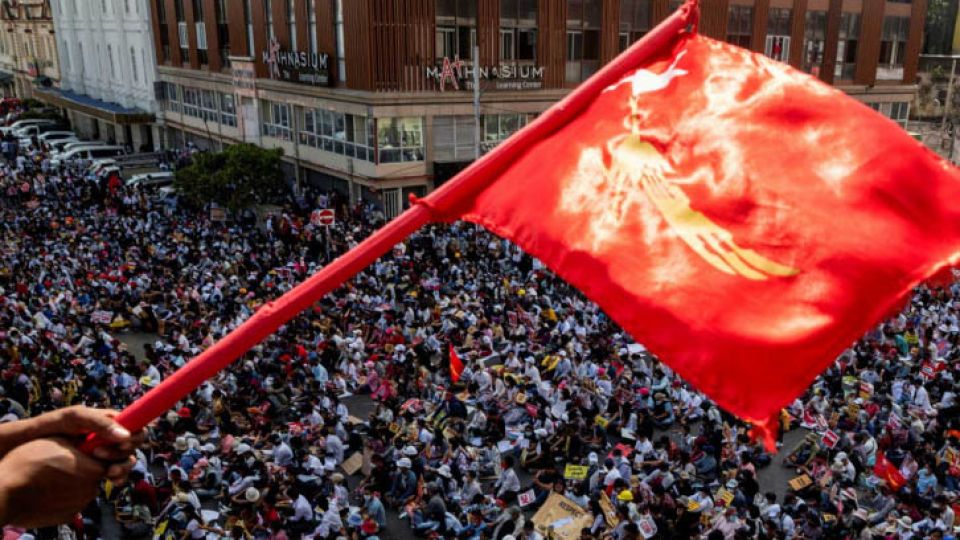February 7, 2022
Myanmar authorities appear to be getting away with their crimes as global attention is focused on the pandemic and, more recently, the Ukraine crisis. February 1, 2022 marked the first anniversary of the brazen coup in which the ruthless military junta seized power and deposed the democratically elected government headed by the National League for Democracy (NLD). Citizens observed the day with a “silent strike” in Yangon, and demonstrated across the country to register their resentment over the junta’s hostilities and the global community’s inaction.
Since the coup, the Tatmadaw has unleashed a reign of terror on Myanmar’s people, killing 1,400 and jailing 11,000, according to the nonprofit Assistance Association for Political Prisoners. The security forces have been indiscriminate in their behaviour, targeting elected members of parliament, journalists, workers and ordinary people protesting against the coup.
All along, the world’s attention seesawed between a soft approach through ASEAN leaders to get some sense into the rulers, and relatively harsher measures like imposing economic sanctions and blacklisting individual members of the ruling elite.
Meanwhile, the solution to the Rohingya crisis, which has been festering since 2017, has not moved an inch. The internal situation in Myanmar—economic, political and humanitarian—has gotten worse, as the ruling clique finds itself almost unscathed while managing to flout all international and democratic norms. And it seems to be succeeding in its diabolical scheme to stay in power, while keeping its guns trained on unarmed civilians. Aung San Suu Kyi, leader of the country’s democracy movement, was tried behind closed doors.
So how does the military keep on functioning so boldly?
According to sources, Myanmar has been economically almost unharmed by foreign sanctions and diplomatic pressures. Businesses controlled by the army are using their rich natural resources to tighten its grip on the country, and slaughter freedom-loving citizens in the Kachin, Karin, Shan, and Rakhine states. The army, local businesses controlled by the dominant ethnic group, and foreign investors have teamed up to provide a lifeline to the various operations of the regime. This unholy alliance is using the oil and gas, gemstones, and timber industries to support the economy and provide foreign exchange to the military for equipment and supplies, and to defray the cost of maintaining the supply chain feeding the military-industrial-mining complex.
Most of the extractive industry revenue in Myanmar comes from four big offshore projects producing natural gas. It is estimated that gas extraction is the source of about 50 percent of Myanmar’s foreign exchange. Myanmar Oil and Gas Enterprise (MOGE) is a state-owned company that operates with international partners such as Chevron and Total to channel billions of dollars into the pocket of the military. MOGE’s purse is totally controlled by the military junta. The Myanmar Ministry of Planning, Finance and Industry has forecasted that MOGE will earn USD 1.5 billion in 2021-2022 from offshore and pipeline projects.
Under international pressure, America’s Chevron and France’s Total repeatedly promised to wind down their operations in Myanmar. TotalEnergies is the largest shareholder and operator of Myanmar’s biggest natural gas project, an offshore field called Yadana, providing energy for domestic use and export. Following the Yadana project, the USD-700-million Yetagun (“flag of victory”) project was the second largest natural gas offshore project in Myanmar. Along with MOGE, the gas fields are jointly owned by Thai, Malaysian, and Japanese companies.
It is clear that enforcement of existing sanctions imposed on Myanmar is very weak. There is also no mechanism to take action against those who continue to do business with Myanmar in defiance of sanctions. Though TotalEnergies and Chevron, on January 21, finally announced plans to withdraw from Myanmar, it needs to be seen who steps in next to keep these gas fields operational.
According to the UN, the Tatmadaw had been able to “insulate itself from accountability and oversight” through a network of conglomerate-owned businesses and affiliates. Two organisations—Myanmar Economic Corporation (MEC) and Myanmar Economic Holdings Limited (MEHL)—have increasingly become key sources of wealth for the Tatmadaw, with stakes in everything from banking and mining to tobacco and tourism.
An Amnesty International (AI) report showed how MEHL and Myanmar’s military units are linked. This information has implications for MEHL’s many foreign and local business partners. “By doing business with the conglomerate, they too are linked to these crimes and violations,” according to AI. “Because MEHL has shown no willingness to engage transparently with its business partners or reform its structure,” AI urged these companies to disengage “responsibly” from MEHL.
The junta recently organised a “Global Mini Gems Emporium” in Naypyidaw to showcase the country’s pearl and precious stones industry. Coloured stones from Myanmar have been prized in the West despite repeated sanctions by the US and other countries. Besides rubies, other precious stones include sapphire, jade, and spinel. Thailand, China, and Cambodia—which are all authoritarian regimes—have gone out of their way to provide moral and economic support to the junta ensconced in Naypyidaw.
The financial flows to the business entities in Myanmar have continued unhindered and unabated, and calls for asset-freezing, expulsion from SWIFT, and other economic sanctions have gone unheeded.
Heidi Hautala, vice-president of the European Parliament, recently called on all EU members to extend sanctions to MOGE. There have been repeated appeals to other companies in the sector to take immediate steps to stop all payments to the junta by whatever means possible. For the US, UK, EU and the UN, it is now high time to step up their game and contain the bad actors in Naypyidaw using broader diplomatic pressure, tighter sanctions, intensified efforts to block arms shipment, and deployment of effective countermeasures.


